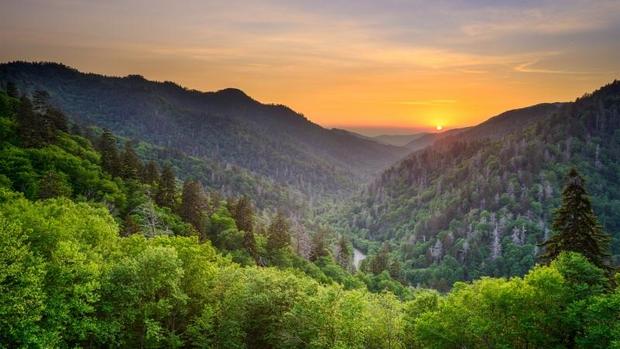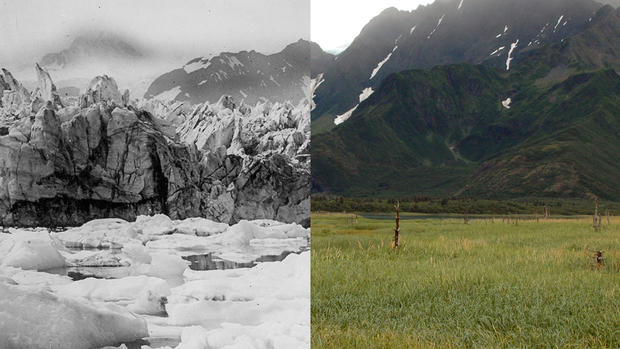Bill Nye talks national parks, climate change and the 2016 election
This week, Bill Nye -- the bow tie-loving mechanical engineer known to many as “The Science Guy” on his own popular 1990s kids TV show -- is helping the National Park Service ring in its 100th birthday.
Nye, an ambassador for the Park Service’s “Find Your Park/Encuentra Tu Parque” campaign, will be at Brooklyn Bridge Park in New York Monday evening for a celebration that also features musical guests like Questlove and activities including an interactive puzzle that controls the colors on the spire at One World Trade Center. It’s all part of a week-long series of events around the country to commemorate the centennial.
The National Park Service officially hits the century mark on Thursday, and Nye says it’s important for Americans recognize the importance of our parkland. Nye spoke with CBS News about some of his favorite places, the dangerous power of those he calls climate change “deniers,” and what he thinks is at stake this election year.
How did you get involved with the National Park Service’s centennial celebration?
They contacted me about being an ambassador -- the National Park Foundation. I lived in Seattle for a long time, certainly have always liked the national parks, and spent a lot of time hiking and camping. I’ve spent time climbing in the northeast. They’re beautiful and important.
Why is it important that we recognize this milestone for our national parks?
We want to preserve our parks for future generations, that’s why this campaign, Find Your Park, is important. It reminds everybody that you can visit a national park and I strongly believe that, once you do, you’ll want to preserve it.
Millions of us have memories of visiting national parks -- whether on family vacations as kids or later on as adults. Do you think we take our national parks for granted?
We want to preserve our parks and the 100th anniversary is an appropriate time to remind everyone their significance and importance. You know, when you vote this November, you should vote to preserve our parks -- it’s another line item in the federal budget, another thing for the government to do. I want everybody to realize that once you “find your park,” you will find an appreciation for the importance of the parks.
You mentioned the time you spent in the Pacific Northwest; do you have a personal favorite national park?
Well, I’m not going to tell you my favorite [laughs]. I was just in Glacier National Park this summer -- it’s spectacular. Yosemite is spectacular, Yellowstone is amazing. The Grand Teton, wow, the Gand Teton National Park -- it’s just spectacular. In New York City, we have a dozen national parks.
The latest one is the Stonewall National Monument, which is preserving where gay rights advocacy got its focus and start. Stonewall is an important monument, it’s about freedom, liberty, and the pursuit of happiness -- a physical space that is very consistent with the first few sentences of the Declaration of Independence.
Going off that, you discussed how a vote in this year’s election is a vote for park preservation. You’ve been very outspoken about the election. How come environmental causes -- climate change, specifically -- have not been brought to the forefront of political debate this year? Domestic, international, and economic issues are at the center, but we really aren’t talking about the environment this cycle. Why is that?
Well, first of all, I’m not telling anyone who to vote for. In my opinion, it’s all due to who I call “the deniers.” The deniers have been very successful -- surprisingly successful -- because they are almost exclusively funded by the fossil fuel industry. So this whole anti-science movement has been set up to preserve an economy that is going away. The rest of the world is moving away from fossil fuels in order to do business, but not the United States. You know, I, as an engineer, as a citizen by birth, as a patriot -- I would prefer that the United States was leading the world in renewable energy. I’d prefer the United States to be leading, but the deniers have been able to influence the power brokers so successfully. The United States has hardly done anything to counteract that. The U.S. has just scratched the surface.
What can be done to ensure this is no longer the case?
You have to say to everybody: “vote.” I’m not telling you for whom to vote, but please take the environment into account when you vote. Right now, you have somebody from the same political party that started the environmental protection industry, somebody from that party who advocates to continue to burn fossil fuels, to not have the United States participate in what everywhere else in the world is doing. I had the general consul from the United Kingdom in my office this morning, and I know they have Brexit and their own problems, but around the world, these people shake their heads at the United States -- the U.S. is a world leader, a do-good country, and right now, we’re just not in respect to climate change.
Depending on whether Donald Trump or Hillary Clinton wins the election, how do you see this changing? Will it change?
If the election goes to the candidate who is in favor of addressing climate change and preserving the environment it will move in one way, but if it goes the other way, it will be very difficult -- it will lower the quality of life for billions of people. United States has to be a world leader when it comes to the environment.
I was at Glacier National Park earlier this summer, and the official park service statement is that the glaciers will be gone by 2030, but all the rangers I spoke with said that they (glaciers) will be gone in five years, six years. We won’t get to even 2025. For me it is really striking. I spoke with a lot of people out there, and they all said that years ago, the glacier was not what it is today. It’s going away.
The glaciers are melting right underneath us.
Anything else you’d like to add about the national parks and the centennial celebration?
Find your park! Go out there and find your national park and enjoy it. I strongly believe that if we do that and get an appreciation for these lands and the monuments that were preserved by our ancestors 100 years ago, we will preserve them for our progeny 100 years hence. Just go out and find your park.


